Stephen Lawrence murder suspect admitted to being paedophile
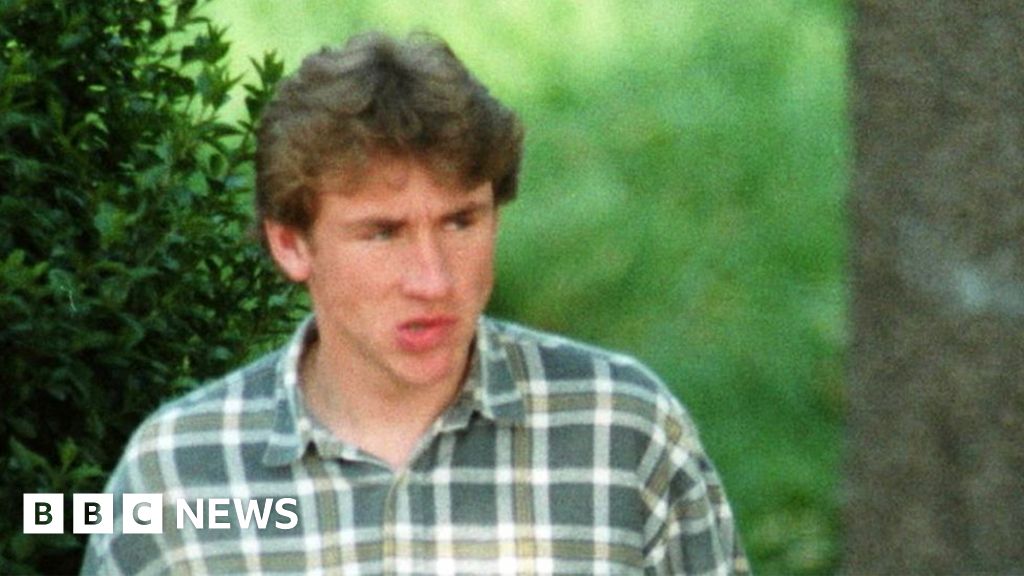
 BBC
BBCA suspect in the racist murder of Stephen Lawrence told police he had a “girlfriend” who was a child, but no action was taken against him, the BBC can reveal.
The lawyer representing Stephen’s mother, Baroness Doreen Lawrence, says the latest findings about Matthew White show again that the Metropolitan Police can’t be trusted to continue investigating the case.
The BBC has also spoken to the girl – now a woman – named by White, who says she wants an apology from the Met.
When approached by the BBC for this article, the Met did not comment specifically on our new findings – but said it had arrested White twice on suspicion of murder and been advised there was not enough evidence to charge him.
A new review of the case was announced in April, following the BBC investigations, and calls by Baroness Lawrence for the case to be reopened.
The Met says the terms of reference for the review “are currently being discussed” with Baroness Lawrence, Stephen’s father Dr Neville Lawrence, and Duwayne Brooks, who was with Stephen when he was attacked.
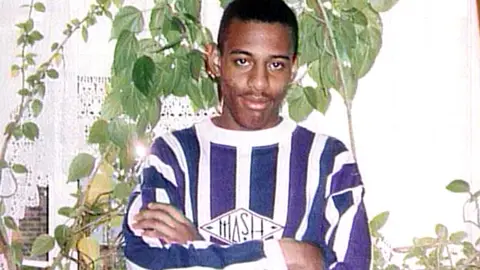 PA Media
PA MediaThe BBC’s latest investigation has also revealed:
- Police documents from 2000 show the Met failed to treat Matthew White as a full murder suspect during a key investigation, contrary to its public claims
- During the same period, the Met bugged the home of a female witness in the case and tried to get her to talk by referring to her on BBC Crimewatch
- The BBC has also found that four years before the 1993 murder, White had been convicted of carrying a machete
Stephen Lawrence was 18 when he was stabbed to death in a racist attack by a group of young white men on 22 April 1993, in Eltham, south London.
The Met’s disastrous handling of the case means only two of his killers have been convicted.
Three other prime suspects remain free, and last year, the BBC publicly identified a sixth – Matthew White, who died in 2021 aged 50. Multiple police failings to properly investigate White were also revealed.
Despite multiple reasons to class White as a suspect from the start, police treated him as a witness for seven years after the murder, until another witness said White had admitted being part of the attack.
The BBC can now also reveal that, during his first interview as a murder suspect in March 2000, White admitted having had a “girlfriend” who police knew was a child.
He was questioned at a south London police station by officers from Operation Athena Tower, a major re-investigation of the murder.
Near the start of the interview White was asked who his “girlfriend” was at the time Stephen was murdered.
White gave her full name and, after being asked how long he had been “going out” with her, he said “two, three years”. The BBC is not identifying the girl, who is now an adult.
According to a transcript seen by the BBC, the following exchange then took place between White and a detective:
Detective: “Okay and from what sort of age were you?”
White: “I was a lot older, she was young.”
Detective: “By older, how much older were you?”
White: “Five, six years.”
Detective: “Five or six years older.”
White: “Five or six years older, yeah.”
There was no follow-up to these questions in further interviews.
In fact, White was lying about the girl’s age. He was almost a decade older than the girl, and had begun sexually abusing her when she was significantly below the age of consent. He was also a drug user and had given the girl heroin.
The Met knew her real age and could have challenged him on it.
Speaking to the BBC, the woman in question says she was never told by the Met about White’s admission and is “absolutely disgusted” to learn about it.
“I just can’t get over the fact that they would just cover that up,” she says.
The woman says she never felt able enough to make a complaint to police, as her life took a “devastating turn” after she met White as a schoolgirl. She says she felt like she was not “worth anything”.
She also says she became pregnant by White and had an abortion.
“I was totally groomed” she tells the BBC. “I struggle every single day.”
She also wants an apology from the Met.
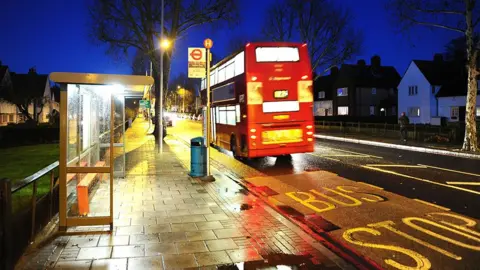 PA Media
PA MediaA new review of the murder – to be carried out by another force – was announced in April, following the BBC investigations and calls by Stephen’s mother, Baroness Doreen Lawrence, for the case to be reopened.
She wants the review to be able to examine the whole case, and to identify chances to bring more killers to justice.
Her solicitor, Imran Khan KC, says the BBC’s latest revelations are “shocking” and show the Met “cannot be trusted in terms of saying that they did a proper investigation. They show they can’t be trusted in terms of doing any future investigations”.
He says that Baroness Lawrence had previously accepted the Met’s insistence that it had done everything it could, but that the BBC has shown that she had been misled.
“She doesn’t believe anything that [the Met police] say,” says Mr Khan. “Whatever they say now about what they did or what they’re going to do, she simply doesn’t take it at face value. They are no longer relevant, as far as she’s concerned, to the issue of investigating Stephen’s murder.”
It is understood the Met has proposed a paper-based review with a limited focus. This would include looking at the decision to close the case in 2020 and what has subsequently been revealed by the BBC.
However, Baroness Lawrence has formally asked for the review to be passed to a “completely independent” investigation team led by retired detective Clive Driscoll, who achieved the two murder convictions in the case. She wants the team to have full investigative powers and look at whatever it chooses.
A spokesperson for the Mayor of London, Sadiq Khan, who oversees the Met, told the BBC: “Far too many mistakes were made in the investigation into Stephen’s Lawrence’s murder and more than three decades after his tragic death it is vital that justice and accountability are delivered.”
The spokesperson said the mayor has “made it clear” that the new review “must command the trust and confidence of the Lawrence family”.
It is understood the mayor’s team have now offered to meet Baroness Lawrence to discuss her concerns and proposals.
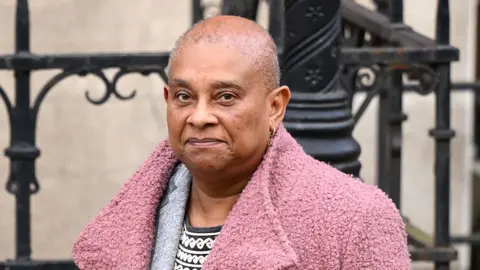 Getty Images
Getty ImagesIn its latest statement to the BBC, the Metropolitan Police repeated its apology for mistakes made in the initial investigation.
Regarding White, it says prosecutors twice ruled out charging him with murder because of a lack of evidence.
But the BBC’s investigations have previously shown he was not thoroughly investigated prior to files being submitted to prosecutors, and the new evidence goes even further.
Documents from 2000, seen by the BBC, reveal the Met did not internally regard White as a serious suspect for the murder. In one, the drug user is only described as a “possible suspect”. It adds: “Drug rehabilitation suggested as a way forward”.
Minutes from a meeting the same year show White being described as a witness rather than a suspect. The minutes say that, if he was not rehabilitated from drugs, then “his ability as a witness is questionable”.
And, in a summary document of the investigation from 2000, prepared for Athena Tower senior officers, White is not listed in a short section on key suspects beyond the five prime suspects arrested in 1993.
At the time of the murder, one of the listed suspects was a slight teenage girl, who we are calling Z3.
The 2000 summary document asks if Z3 was the “blonde offender”, a reference to an unidentified fair-haired lead attacker described by eyewitnesses to the murder.
However, from the start in 1993, key eyewitness Duwayne Brooks clearly stated that this had been a stocky man with bushy light-brown hair.
The BBC has previously revealed that, at the time of the murder, Matthew White answered to Mr Brooks’s description of the attacker.
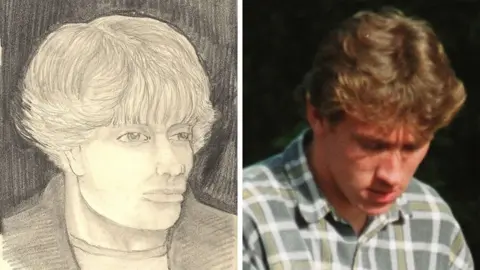
We have now established that at least 30 covert operations took place during the Athena Tower period – several people were followed by surveillance teams and multiple homes were bugged.
White was not bugged despite all the evidence against him.
The Athena Tower documents describe an “intrusive attack of home address” on Z3, meaning a secret bugging operation.
The Met even used an appeal on BBC Crimewatch to “stimulate” Z3 to talk. Having bugged her home, they hoped to trigger conversation by making anonymised references to her on Crimewatch. However, the bug failed.
Approached by BBC News, and asked if it was aware of what the Met had done, the BBC said in a statement: “It is the longstanding position that the information/content of police appeals on Crimewatch is a matter for the police force involved.”
We have also discovered that four years before Stephen’s murder, Matthew White had been convicted of carrying a machete.
Details of an offensive weapon conviction were found in a largely handwritten court register from 1989, held in an uncatalogued archive.
The court entry, from Woolwich Magistrates’ Court, stated White had a “large machete” in an Eltham street earlier that year, near to where Stephen was later killed.
Despite this conviction, and despite resembling the “fair-haired lead attacker” who was described as brandishing a large weapon, White was not questioned about this either in 1993 as a witness, or as a suspect years later.
Related
Youth football teams hold minute’s silence for 10-year-old Poppy Atkinson
Youth football teams and grassroots clubs across the country have held a minute’s silence at the start of their games to commemorate a 10-year-old girl who di
Girl’s death sparks minute’s silence at football matches nationwide
10-year-old Poppy Atkinson was killed when she was struck by a car during a training session at Kendal Rugby Club in Cumbria. Clubs from Leeds to London
Liverpool fans’ Uefa claim can be heard in England, judge…
The high court, sitting in Liverpool, heard Uefa had relied upon the principle that English courts will not inquire into the legality of actions by foreign gove
Alan Shearer’s Premier League predictions including Manchester United vs Arsenal
Caption: Alan Shearer?s Premier League predictions credit: Getty / Metro After some impressive results for English sides in Europe the focus is













